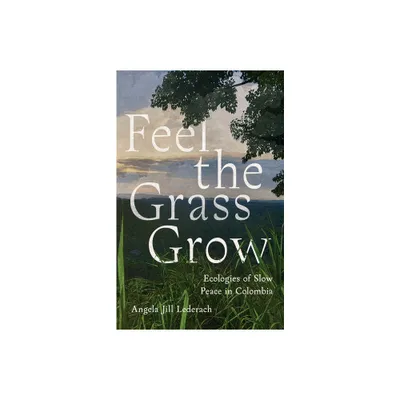Home
Feel the Grass Grow: Ecologies of Slow Peace Colombia
Loading Inventory...
Barnes and Noble
Feel the Grass Grow: Ecologies of Slow Peace Colombia
Current price: $90.00


Barnes and Noble
Feel the Grass Grow: Ecologies of Slow Peace Colombia
Current price: $90.00
Loading Inventory...
Size: Hardcover
*Product Information may vary - to confirm product availability, pricing, and additional information please contact Barnes and Noble
On November 24, 2016, the Colombian government and the Revolutionary Armed Forces of Colombia signed a revised peace accord that marked a political end to over a half-century of war.
Feel the Grass Grow
traces the far less visible aspects of moving from war to peace: the decades of campesino struggle to defend life, land, and territory prior to the national accord, as well as campesino social leaders' engagement with the challenges of the state's post-accord reconstruction efforts. In the words of the campesino organizers, "peace is not signed, peace is built."
Drawing on nearly a decade of extensive ethnographic and participatory research, Angela Jill Lederach advances a theory of "slow peace." Slowing down does not negate the urgency that animates the defense of territory in the context of the interlocking processes of political and environmental violence that persist in post-accord Colombia. Instead, Lederach shows how the campesino call to "slowness" recenters grassroots practices of peace, grounded in multigenerational struggles for territorial liberation. In examining the various layers of meaning embedded within campesino theories of "the times (
los tiempos
)," this book directs analytic attention to the holistic understanding of peacebuilding found among campesino social leaders. Their experiences of peacebuilding shape an understanding of time as embodied, affective, and emplaced. The call to slow peace gives primacy to the everyday, where relationships are deepened, ancestral memories reclaimed, and ecologies regenerated.
Feel the Grass Grow
traces the far less visible aspects of moving from war to peace: the decades of campesino struggle to defend life, land, and territory prior to the national accord, as well as campesino social leaders' engagement with the challenges of the state's post-accord reconstruction efforts. In the words of the campesino organizers, "peace is not signed, peace is built."
Drawing on nearly a decade of extensive ethnographic and participatory research, Angela Jill Lederach advances a theory of "slow peace." Slowing down does not negate the urgency that animates the defense of territory in the context of the interlocking processes of political and environmental violence that persist in post-accord Colombia. Instead, Lederach shows how the campesino call to "slowness" recenters grassroots practices of peace, grounded in multigenerational struggles for territorial liberation. In examining the various layers of meaning embedded within campesino theories of "the times (
los tiempos
)," this book directs analytic attention to the holistic understanding of peacebuilding found among campesino social leaders. Their experiences of peacebuilding shape an understanding of time as embodied, affective, and emplaced. The call to slow peace gives primacy to the everyday, where relationships are deepened, ancestral memories reclaimed, and ecologies regenerated.


















